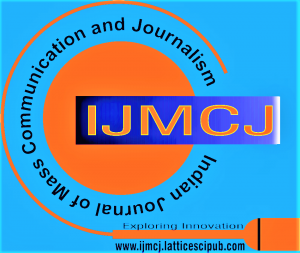![]()
Content Analysis of Hate Speech in the 2023 General Elections in Two Selected Newspapers in Nigeria
Eric Msughter Aondover1, Timothy Ekeledirichukwu Onyejelem2, Collins Sopuruchukwu Iloanya3
1Eric Msughter Aondover, Department of Mass Communication, Caleb University, Imota (Lagos), Nigeria.
2Timothy Ekeledirichukwu Onyejelem, Department of Journalism and Media Studies, Federal University Otuoke, (Bayelsa State), Nigeria.
3Collins Sopuruchukwu Iloanya, Department of Mass Communication, Caleb University, Imota (Lagos) Nigeria.
Manuscript received on 12 August 2024 | First Revised Manuscript received on 28 August 2024 | Second Revised Manuscript received on 24 February 2025 | Manuscript Accepted on 15 March 2025 | Manuscript published on 30 March 2025 | PP: 21-29 | Volume-4 Issue-3, March 2025 | Retrieval Number: 100.1/ijmcj.E110303050924 | DOI:10.54105/ijmcj.E1103.04030325
Open Access | Editorial and Publishing Policies | Cite | Zenodo | OJS | Indexing and Abstracting
© The Authors. Published by Lattice Science Publication (LSP). This is an open-access article under the CC-BY-NC-ND license (http://creativecommons.org/licenses/by-nc-nd/4.0/)
Abstract: Hate speech is one of the communication challenges affecting human society. Not restricted to any group, ethnicity or country, but rather a global mass phenomenon. Election is a common phenomenon where the masses raise accusatory and provocative statements, resulting in hate speech against individuals or specified groups. The research, therefore, aims to comparatively examine the prevalence of hate speech in The Nation and Vanguard newspapers. The study utilises Agenda Setting and Framing theory in explaining the manifestation of hate speech during the 2023 general elections in Nigeria. Utilizing the content analysis, the study evaluates the manifestation of hate speech within the periods of six months (before election, during the election and after the election). The data were collected using a coding sheet, and stratified sampling by days of the week was adopted. A sample size of five hundred and thirty-six (536) news articles on hate speech was analysed in the two newspapers. Based on the findings, it was discovered that the two newspapers under study reported a higher level of hate speech cases published before the election than during or after the election, at 71.2%. Based on the findings, it is recommended that the media should strive to raise awareness about the consequences of hate speech during elections in Nigeria.
Keywords: Global Mass Phenomenon, General Elections, Common Phenomenon.
Scope of the Article: Media Studies
